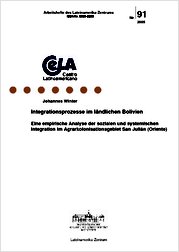Integrationsprozesse im ländlichen Bolivien
Eine empirische Analyse der sozialen und systemischen Integration im Agrarkolonisationsgebiet San Julián (Oriente)
2005Lateinamerika-Zentrum, Universität Münster
Monografie
Verlagsversion
Deutsch
Winter, Johannes, 2005: Integrationsprozesse im ländlichen Bolivien - Eine empirische Analyse der sozialen und systemischen Integration im Agrarkolonisationsgebiet San Julián (Oriente). Lateinamerika-Zentrum, Universität Münster, DOI: 10.23689/fidgeo-687.
 |
Dokument öffnen: |
Das östliche Tiefland von Bolivien, der so genannte Oriente, wird seit nunmehr einem
halben Jahrhundert von umfangreichen Zuwanderungen aus den benachbarten Provinzen und dem Hochland heimgesucht. Dabei ist die Binnenmigration ein demographisches Phänomen, das den Oriente auf unterschiedliche Weise in seiner Regionalentwicklung beeinträchtigt. Einerseits kommt es zu einer tiefgründigen
Modifikation der Landschaft durch Nutzung und Ausbeutung der natürlichen Ressourcen. Anderseits führen die Wanderungsbewegungen zu einer sukzessiven Transformation der Aufnahmegesellschaft. Intensität und Ausmaß der Gesellschaftsveränderungen hängen vom Grad der Integration der beteiligten Akteure
ab. Es ist davon auszugehen, dass sowohl das gesellschaftliche als auch das ökologische Gleichgewicht davon abhängen, inwieweit eine Eingliederung der zugewanderten Individuen und Gruppen in das soziale System (soziale Integration) gelingt, – und inwieweit die verschiedenen Teilbereiche der Gesellschaft (politisches, ökonomisches, soziales und edukatives System) im Austausch miteinander stehen bzw. harmonieren. Die empirische Feldforschung im Agrarkolonisationsgebiet San Julián (Departamento de Santa Cruz) bezog sich auf den Zusammenhang zwischen der
Integration von Zuwanderern und den Auswirkungen auf die regionale Kulturlandschaft. Internal rural migration is a demographic phenomenon which affects the eastern Bolivian
lowlands mainly in two different ways. On the one hand the migrations provoke a profound
modification of the landscape by exploitation and potential degradation of the natural
resources. On the other hand massive inflows of migrants cause the transformation of
the local society. Intensity and dimension of those modifications depend on the level of
integration of the individuals and groups which are involved. Consequently, the inclusion of the actors into the social system (social integration) as well as the relationship between the parts of the society (systemic integration) determine the societal as well as the ecological equilibrium.
An empirical analysis of the integration process of migrants from the Andean highlands
was realised in the colonisation area of San Julián, Dpt. of Santa Cruz, Bolivia. One main aspect of the investigation focused on the rural poverty and different standards of living of migrant and local households. Empirical data were collected through semi-structured interviews as well as standardised interviews in two villages (98 households). The results show a latent correlation between social integration and individual management of common natural resources. A high degree of personal integration about the four dimensions of social integration, which are “cultural adaptation”, “positioning”, “interaction”
and “identification”, encourages the sensitivity for common socioeconomic
welfare through specific livelihood strategies. The current situation in the research area is characterised by the fragile systemic integration of the colonisation area into the regional economy and society. This fact complicates not only social integration and intercultural living together between migrants from the Andean highlands and the lowland people, but also threatens the ecological balance of the region. Consequently, without the political and civil intentions to resolve the systemic disintegration there will not be a sustainable socio-economic development.
Statistik:
ZugriffsstatistikSammlung:
- Geographie, Hydrologie [454]
Schlagworte:
BolivienWirtschaftsgeographie
Migration
Regionalentwicklung
Agrarkolonisation
Integration
Multikulturelle Gesellschaft
Importsubstitution
Sozialgeographie
Sozialgeographie im engeren Sinn
Wirtschaftsgeographie
Ländlicher Raum {Siedlungsgeographie}
Wanderung, Nomadismus {Geographie}
Sozialgeographische Gruppen {Sozialgeographie}
Wanderungen {Entwicklungsländerforschung}
Entwicklungsstrategien, Entwicklungshilfe {Entwicklungsländerforschung}
Empirische Entwicklungsländerforschung
Theoretische Entwicklungsländerforschung
Kulturgeographie von Südamerika
Kulturgeographie der Tropischen Andenländer
Bolivien {Geographie}

